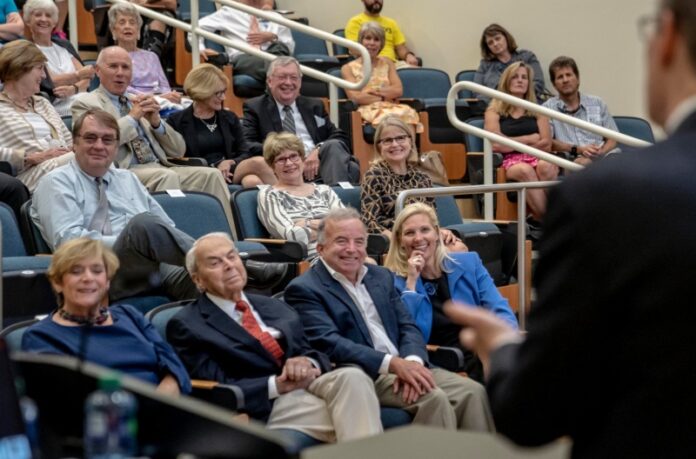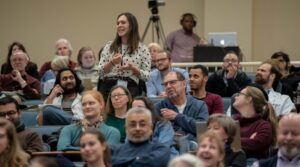
A Nobel prize winner and two National Institutes of Health leaders are among internationally known speakers programmed for the new season of the Fralin Biomedical Research Institute at VTC Maury Strauss Distinguished Public Lecture Series in Roanoke.
The free lectures, named for Maury Strauss, a Roanoke businessman and longtime community benefactor, feature scientific topics straight from today’s headlines, from climate change to human gene editing.
“We strive to present the world’s leading authorities on advanced, thought-provoking topics in science, medicine, health, and policy,” said Michael Friedlander, executive director of the Fralin Biomedical Research Institute and host of the seminar series. “Sharing the excitement and promise of scientific and biomedical research with the Roanoke community and our Virginia Tech and Carilion Clinic colleagues is an important part of our mission. The experts who visit the research institute are leading contributors and voices on the cutting edge of the latest knowledge, vision, and implementation of improved health and quality of life.”
Because of the demand for quality scientific speakers, some of the lectures are scheduled more than a year in advance.
Nobel laureate Michael Young, a biologist and geneticist who received the 2017 Nobel Prize in Physiology or Medicine for his contributions to the science of circadian rhythms, will be among this season’s visitors. Young discovered the molecular mechanisms in cells that help us set our biological clocks to the different phases of day and night.
In addition, Eliseo Perez-Stable, director of the National Institute of Minority Health and Health Disparities, will talk about an effort to bridge the sciences and develop a coordinated research vision to improve health outcomes in populations that experience health disparities. His work shines a light on ways to improve health care for racial and ethnic minorities, socioeconomically disadvantaged populations, underserved rural populations, and sexual and gender minorities.
Another National Institutes of Health official, Christopher Austin, director of the National Center for Advancing Translational Sciences, will explain the easily misunderstood process of translating observations in the laboratory or clinic into useful health care interventions.

The lecture series kicks off on Sept. 19 with Julie Pulerwitz, the director of the HIV and AIDS program of the Population Council, an international nonprofit organization that conducts research in biomedicine, social science, and public health.
A leader in implementation science, Pulerwitz stresses that for HIV research to effectively inform programs and policies, researchers must engage in regular dialogue with communities and policymakers — along the lines of the Strauss lectures.
“It’s important for community members to be involved in our research activities,” said Friedlander, who is also the vice president for health sciences and technology at Virginia Tech. “As scientists, we need to engage in activities that make a difference in people’s lives. That is why the Fralin Biomedical Research Institute works hard to create interactions that bring together community members, local scientists, and international thought leaders. Presenting these speakers is the cornerstone for the growth of the Virginia Tech Carilion Academic Health Center and the Roanoke Innovation Corridor.”
Maury Strauss Distinguished Public Lecture Series events begin with a free public reception at 5 p.m. followed by the hour-long lecture starting at 5:30 p.m. at 2 Riverside Circle in Roanoke, Virginia.
Upcoming topics and speakers include:
- “Transforming Evidence into HIV Policies and Practice: Lessons from Global Implementation Science,” presented by Julie Pulerwitz, director of the Population Council’s HIV and AIDS Program on Sept. 19, 2019.
- “The Science of Minority Health and Health Disparities: NIMHD Perspective,” presented by Eliseo Perez-Stable, director of the National Institute of Minority Health and Health Disparities, on Oct. 17, 2019.
- “Preparing for Global Climate Change,” presented by Vicki Arroyo, executive director of the Georgetown Climate Center, on Nov. 7, 2019.
- “Social Inequality and Cancer Survival: How Can We Close the Gap?” presented by Ophira Ginsburg, director of the Perlmutter Cancer Center’s High-Risk Cancer Genetics Program at NYU Langone Health, on Dec. 5, 2019.
- “What’s Next in Digital Health Care?” presented by John Halamka, professor of medicine at Harvard Medical School and chief information officer, Beth Israel Deaconess Medical Center; chairman, New England Healthcare Exchange Network, on Dec. 12, 2019.
- “Catalyzing Translational Innovation,” presented by Christopher Austin, director of the National Center for Advancing Translational Sciences, on Jan. 23, 2020.
- “The Cognition Crisis: Perils and Promise of Technology and the Brain,” presented by Adam Gazzaley, the University of California, San Francisco’s David Dolby Distinguished Professor of Neurology, Physiology, and Psychiatry, on Feb. 27, 2020.
- “Engineering Reproduction: From Bench to Bedside to Babies,” presented by Teresa Woodruff, Thomas J. Watkins Professor and vice chair of research at Northwestern University’s Department of Obstetrics and Gynecology, on March 12, 2020.
- “How Vaccines Train the Immune System in Ways No One Expected,” presented by Christine Stabell Benn, professor of Global Health at the University of Southern Denmark, on April 16, 2020.
- “Genes Regulating Sleep and Circadian Rhythms,” Michael Young, Nobel laureate and professor and vice president for academic affairs at The Rockefeller University, on April 30, 2020.
- “Pediatric Robotics: A Journey from the Lab to a Child’s Home,” presented by Ayanna Howard, professor and chair of the School of Interactive Computing at Georgia Tech, Oct. 15, 2020.
- “Tiny Conspiracies: Cell to Cell Communication in Bacteria,” presented by Bonnie Bassler, Squibb Professor in Molecular Biology and Chair at Princeton University, on Oct. 29, 2020.
